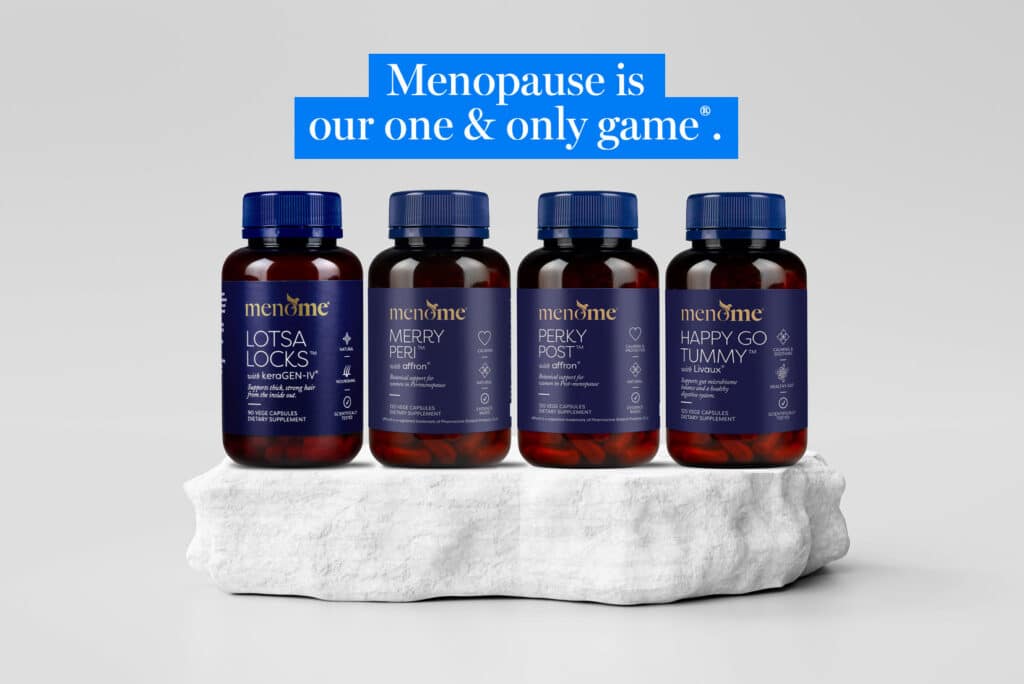When we published 3 Signs That Point To You Being In Perimenopause, so many people read it we realised you’re starved of information.
We get it. We totally do, and I definitely do, because that’s where I was. These days, since working with MenoMe®, my knowledge of perimenopause has grown exponentially 😀. I’m a researcher so when a subject interests me I’m in there boots and all. In fact, it’s one reason I’ve spent 10 years studying menopause and am an accredited health and menopause coach.
So let’s look at what exactly happens to the body we’ve lived in, and many have battled with, for decades during peri/menopause, shall we?
Eggs, Periods & Hormones

As you may know, women are born with a finite number of eggs, technically known as oocytes, in their ovaries. They begin to die off before we’re even born! The ovaries make the hormones estrogen and progesterone (as do many other parts of the body) however, it’s the ovarian hormones that are the drivers behind our periods, ovulation, fertility and the stages of menopause.
Henry Dierop
And boy, don’t a lot of us struggle with these hormones? Periods? Ugh. My gals and I used to call periods Henry Dierop. ‘Henry came to breakfast,” we’d say. LOL. I – and lots of my gal pals – would dread them. They’d interfere with exercise regimes (sore boobs, leakage), mood (not helpful to relationships), work (enough said), eating (cue the chocolate craving) and how we looked (pimples, bloated tummies).
Then there would be the times our fingers were crossed praying that ‘Henry’ would come to visit. You know the one right? The fear of an unplanned pregnancy.
Fertility

After that came the ups and downs of the fertility journey. It was really only then that most of us discovered ovulation cycles and peak fertility times. Some of us learned the urgency of needing to ravish our partners right then for the best chance of conception followed by the seemingly endless wait to see whether we’d been successful or whether Mr Dierop would come to visit again.
Along with the excitement of success came the rollercoaster hormonal shifts of pregnancy like crying at the drop of a hat, tender breasts and lots more physical changes.
I am (a confused) woman
It’s all part of the journey of being a woman. And so is the next phase, the lead up to menopause known as perimenopause and menopause itself.
But it also has to be said it’s highly confusing
When we published 3 Signs That Point To You Being In Menopause, so many people read it we realised you’re starved of information. Share on X
The Meno Years
Just as with menstruation, as we enter perimenopause the mood swings still happen and there are other similarities like breast tenderness, fatigue and depression. However, they may also be joined by other signs like a thicker waist, hot flushes, thinner hair, itchy skin, headaches, sleeplessness and so much more (read the full list here).
The truth is, we could start our perimenopause journey as early as our late 30s but with so many similarities to our period how the heck do we know?
NB: I’m referring to natural menopause not chemically induced or premature menopause – they’re a different story, which we’ll cover at a later date.
The answer is we don’t. There’s no big announcement from Mother Nature. Our doctor can’t definitively tell us either – although blood tests can measure some hormone levels – the only way to know menopause has occurred is one year after our last period, and this we only know in hindsight.
So, basically, menopause occurs when that finite number of eggs run out and our ovaries cease to produce estrogen or, specifically estradiol.
There are three stages of the menopause journey:
1. Perimenopause
As I’ve already mentioned this can be a time of great confusion because so many of the signs of normal menstruation and perimenopause are the same. And really, let’s be honest here, for most of us perimenopause wasn’t even on our radar when it began. We think peri is somewhere off in the distance. We know menopause is coming but we’re too young for it to arrive right now so we don’t notice it creeping up. It’s a slow process but this is a time when our ovaries begin producing less estrogen and the few eggs we might have left are senior citizens. Indeed, our estrogen, progesterone and testosterone/androgens can go up and down for a few years. If you haven’t already, do read 3 Signs That Point To You Being In Perimenopause and How To Have Great Skin After 40.
2. Menopause
I love the words of Felice Gersh MD who wrote on Mind Body Green that ‘menopause is a poorly chosen word’ and we should ‘banish it forever’. I agree with her completely, maybe for different reasons but it does tend to bring on cases of acutely glazed over expressions. Talking about menopause in daily life is taboo (though we talk about it all the time around here)! The word menopause comes from the Greek language – ‘meno’ means moon and ‘pause’ means end. This probably stems from the fact that before the age of electricity women’s cycles tended to go in sync with lunar cycles.
As Dr Gersh points out menopause is a process of ovarian ageing, known as senescence. Now there’s a nicer term don’t you think?
The definition of menopause is one year after your last period and is completely normal. It’s not an illness, and if you’re a woman and live long enough you will go through it. It’s not negotiable.
However, it can mean huge life changes because it’s the end of babies, possibly new health challenges and also – increasingly – changes in the workplace.
3. Post-Menopause
Post-Menopause refers to the years when signs begin to subside and our hormones find some stability again. We are forever changed, but once we are through to the other side many women report feeling a sense of freedom and happiness in this new phase of life.
However, post-menopause is also a time when we should be aware that lack of estrogen can lead to other health issues such as:
- Osteoporosis
- Heart disease
- Bladder control issues
- Reduced skin elasticity
- Loss of muscle tone
- Rheumatoid arthritis
- Diabetes
- Vaginal dryness
- Blood pressure changes
- Decreased immunity
- Gut issues
That doesn’t sound like much fun does it, ladies? Let’s look at it as the nudge we need to up our nutrition and indulge in self-care 😀. It’s a time for me-time now more than ever.
And remember, we’re right here for you. That’s why we like to call our community a sisterhood, plus we’ve got a few solutions to help including Merry Peri® and Perky Post® to help with hormonal shifts. Then there’s Happy Go Tummy® for gut health because digestion changes and LotsaLocks® for hormonally-driven thinning hair.
And hey, I’m definitely right beside you sister!
Hope that helps and, as always, if you have any questions don’t hesitate to get in touch here 😀









